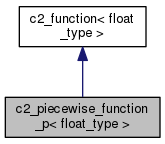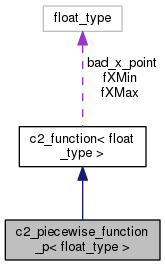|
Geant4
10.03.p03
|
|
Geant4
10.03.p03
|
create a c2_function which is a piecewise assembly of other c2_functions.The functions must have increasing, non-overlapping domains. Any empty space between functions will be filled with a linear interpolation. More...
#include <c2_function.hh>


Public Member Functions | |
| c2_piecewise_function_p () | |
| construct the container More... | |
| virtual | ~c2_piecewise_function_p () |
| destructor More... | |
| virtual float_type | value_with_derivatives (float_type x, float_type *yprime, float_type *yprime2) const |
| get the value and derivatives. More... | |
| void | append_function (const c2_function< float_type > &func) |
| append a new function to the sequence More... | |
 Public Member Functions inherited from c2_function< float_type > Public Member Functions inherited from c2_function< float_type > | |
| const std::string | cvs_header_vers () const |
| get versioning information for the header file More... | |
| const std::string | cvs_file_vers () const |
| get versioning information for the source file More... | |
| virtual | ~c2_function () |
| destructor More... | |
| float_type | operator() (float_type x) const |
| evaluate the function in the classic way, ignoring derivatives. More... | |
| float_type | operator() (float_type x, float_type *yprime, float_type *yprime2) const |
| get the value and derivatives. More... | |
| float_type | find_root (float_type lower_bracket, float_type upper_bracket, float_type start, float_type value, int *error=0, float_type *final_yprime=0, float_type *final_yprime2=0) const |
| solve f(x)==value very efficiently, with explicit knowledge of derivatives of the function More... | |
| float_type | partial_integrals (std::vector< float_type > xgrid, std::vector< float_type > *partials=0, float_type abs_tol=1e-12, float_type rel_tol=1e-12, int derivs=2, bool adapt=true, bool extrapolate=true) const |
| float_type | integral (float_type amin, float_type amax, std::vector< float_type > *partials=0, float_type abs_tol=1e-12, float_type rel_tol=1e-12, int derivs=2, bool adapt=true, bool extrapolate=true) const |
| a fully-automated integrator which uses the information provided by the get_sampling_grid() function to figure out what to do. More... | |
| c2_piecewise_function_p < float_type > * | adaptively_sample (float_type amin, float_type amax, float_type abs_tol=1e-12, float_type rel_tol=1e-12, int derivs=2, std::vector< float_type > *xvals=0, std::vector< float_type > *yvals=0) const |
| create a c2_piecewise_function_p from c2_connector_function_p segments which is a representation of the parent function to the specified accuracy, but maybe much cheaper to evaluate More... | |
| float_type | xmin () const |
| float_type | xmax () const |
| void | set_domain (float_type amin, float_type amax) |
| size_t | get_evaluations () const |
| void | reset_evaluations () const |
| reset the counter More... | |
| void | increment_evaluations () const |
| count evaluations More... | |
| bool | check_monotonicity (const std::vector< float_type > &data, const char message[]) const |
| check that a vector is monotonic, throw an exception if not, and return a flag if it is reversed More... | |
| virtual void | set_sampling_grid (const std::vector< float_type > &grid) |
| establish a grid of 'interesting' points on the function. More... | |
| std::vector< float_type > * | get_sampling_grid_pointer () const |
| get the sampling grid, which may be a null pointer More... | |
| virtual void | get_sampling_grid (float_type amin, float_type amax, std::vector< float_type > &grid) const |
| void | preen_sampling_grid (std::vector< float_type > *result) const |
| The grid is modified in place. More... | |
| void | refine_sampling_grid (std::vector< float_type > &grid, size_t refinement) const |
| c2_function< float_type > & | normalized_function (float_type amin, float_type amax, float_type norm=1.0) const |
| create a new c2_function from this one which is normalized on the interval More... | |
| c2_function< float_type > & | square_normalized_function (float_type amin, float_type amax, float_type norm=1.0) const |
| c2_function< float_type > & | square_normalized_function (float_type amin, float_type amax, const c2_function< float_type > &weight, float_type norm=1.0) const |
| create a new c2_function from this one which is square-normalized with the provided weight on the interval More... | |
| c2_sum_p< float_type > & | operator+ (const c2_function< float_type > &rhs) const |
| factory function to create a c2_sum_p from a regular algebraic expression. More... | |
| c2_diff_p< float_type > & | operator- (const c2_function< float_type > &rhs) const |
| factory function to create a c2_diff_p from a regular algebraic expression. More... | |
| c2_product_p< float_type > & | operator* (const c2_function< float_type > &rhs) const |
| factory function to create a c2_product_p from a regular algebraic expression. More... | |
| c2_ratio_p< float_type > & | operator/ (const c2_function< float_type > &rhs) const |
| c2_composed_function_p < float_type > & | operator() (const c2_function< float_type > &inner) const |
| compose this function outside another. More... | |
| float_type | get_trouble_point () const |
| Find out where a calculation ran into trouble, if it got a nan. If the most recent computation did not return a nan, this is undefined. More... | |
| void | claim_ownership () const |
| increment our reference count. Destruction is only legal if the count is zero. More... | |
| size_t | release_ownership_for_return () const |
| decrement our reference count. Do not destroy at zero. More... | |
| void | release_ownership () const |
| size_t | count_owners () const |
| get the reference count, mostly for debugging More... | |
| void | fill_fblock (c2_fblock< float_type > &fb) const |
| fill in a c2_fblock<float_type>... a shortcut for the integrator & sampler More... | |
Protected Attributes | |
| std::vector< c2_const_ptr < float_type > > | functions |
| int | lastKLow |
 Protected Attributes inherited from c2_function< float_type > Protected Attributes inherited from c2_function< float_type > | |
| std::vector< float_type > * | sampling_grid |
| bool | no_overwrite_grid |
| float_type | fXMin |
| float_type | fXMax |
| size_t | evaluations |
| float_type | bad_x_point |
| this point may be used to record where a calculation ran into trouble More... | |
Additional Inherited Members | |
 Protected Member Functions inherited from c2_function< float_type > Protected Member Functions inherited from c2_function< float_type > | |
| c2_function (const c2_function< float_type > &src) | |
| c2_function () | |
| virtual void | set_sampling_grid_pointer (std::vector< float_type > &grid) |
create a c2_function which is a piecewise assembly of other c2_functions.
The functions must have increasing, non-overlapping domains. Any empty space between functions will be filled with a linear interpolation.
Definition at line 84 of file c2_function.hh.
| c2_piecewise_function_p< float_type >::c2_piecewise_function_p | ( | ) |
construct the container
|
virtual |
destructor
| void c2_piecewise_function_p< float_type >::append_function | ( | const c2_function< float_type > & | func | ) |
append a new function to the sequence
This takes a c2_function, and appends it onto the end of the piecewise collection. The domain of the function (which MUST be set) specifies the place it will be used in the final function. If the domain exactly abuts the domain of the previous function, it will be directly attached. If there is a gap, the gap will be filled in by linear interpolation.
| func | a c2_function with a defined domain to be appended to the collection |

|
virtual |
get the value and derivatives.
There is required checking for null pointers on the derivatives, and most implementations should operate faster if derivatives are not
| [in] | x | the point at which to evaluate the function |
| [out] | yprime | the first derivative (if pointer is non-null) |
| [out] | yprime2 | the second derivative (if pointer is non-null) |
Implements c2_function< float_type >.
|
protected |
Definition at line 2328 of file c2_function.hh.
|
mutableprotected |
Definition at line 2329 of file c2_function.hh.